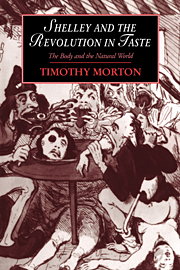Book contents
- Frontmatter
- Contents
- List of figures
- Acknowledgements
- List of abbreviations and a note on the text
- Introduction: prescriptions
- 1 The rights of brutes
- 2 The purer nutriment: diet and Shelley's biographies
- 3 In the face: the poetics of the natural diet
- 4 Apollo in the jungle: healthy morals and the body beautiful
- 5 Intemperate figures: re-fining culture
- 6 Sustaining natures: Shelley and ecocriticism
- Notes
- Bibliography
- Index
- Title in the series
3 - In the face: the poetics of the natural diet
Published online by Cambridge University Press: 31 October 2009
- Frontmatter
- Contents
- List of figures
- Acknowledgements
- List of abbreviations and a note on the text
- Introduction: prescriptions
- 1 The rights of brutes
- 2 The purer nutriment: diet and Shelley's biographies
- 3 In the face: the poetics of the natural diet
- 4 Apollo in the jungle: healthy morals and the body beautiful
- 5 Intemperate figures: re-fining culture
- 6 Sustaining natures: Shelley and ecocriticism
- Notes
- Bibliography
- Index
- Title in the series
Summary
no longer now
He slays the lamb that looks him in the face,
And horribly devours his mangled flesh.
Shelley, Queen Mab VIII.211INTRODUCTION
Shelley's imagining of the consuming self interpellates a discourse of diet, rather than a simple or gratuitous use of food imagery. This chapter discusses Shelley's poetic representation of vegetarianism in six poems, Queen Mab, The Daemon of the World, Alastor, Laon and Cythna, Marenghi and Prometheus Unbound. It analyses the relationship between consumption and Utopian vision in Queen Mab, employing the concept of the rhetoric of dismemberment (macellogia). Alastor is explored as a poetic revision of Queen Mab, a critique of Wordsworth, and a development of the figuration of‘nature’. The politicization of diet is explored in readings of Laon and Cythna, Marenghi and Prometheus Unbound.
The chapter confronts different aspects of the discourse of natural diet: faciality, violence as figuration, ascetic discipline, decoding (for example, the destruction of despotic hierarchies and boundaries between ‘man’ and ‘the natural world’), and recoding (narratives of Fall, redemption and the Golden Age). Shelley's use of Isaiah, Pope and Southey is explored. Isaiah provided images of pastoral redemption and human reconciliation with the natural world. Pope set forth ways of elaborating a ‘natural-state State’ logic through discourses of the Golden Age and consumption. Southey was a figurative resource, which Shelley often politicizes or desacralizes further. Southey used food imagery in a vigorous record of popular life. Shelley deploys his orientalism (and the high-octane style), blending it with Isaiah.
Links between Shelley's vegetarianism and his poetry have been discussed briefly, but are mostly ignored. It is clear from the last chapter that Shelley's natural diet was mainly ideological.
- Type
- Chapter
- Information
- Shelley and the Revolution in TasteThe Body and the Natural World, pp. 81 - 126Publisher: Cambridge University PressPrint publication year: 1995



